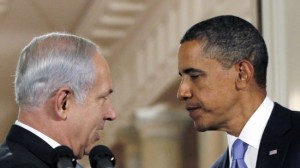 Israel needs to make some " tough" decisions in order to move forward on peace talks with the Palestinians, U.S. President Barack Obama told Israeli Prime Minister Benjamin Netanyahu on Monday.
Israel needs to make some " tough" decisions in order to move forward on peace talks with the Palestinians, U.S. President Barack Obama told Israeli Prime Minister Benjamin Netanyahu on Monday."The timeframe that we have set up for completing these negotiations is coming near and some tough decisions are going to have to be made," Obama said before a bilateral meeting with Netanyahu at the White House.
Israel and the Palestinians resumed peace talks last July after a three-year halt. U.S. Secretary of State John Kerry had aimed for a deal on all the final-status issues -- security, border, the status of Jerusalem and refugees, within nine months.
However, no visible progress has been made so far in the talks, and Kerry said last week that they will likely proceed beyond the original deadline of April.
Calling the talks "lengthy and painstaking," Obama said he believed that "ultimately it is still possible to create two states, a Jewish state of Israel and a state of Palestine, in which people are living side by side in peace and security."
"But it's difficult and it requires compromise on all sides," Obama added.
"Israel has been doing its part and, I regret to say, the Palestinians have not," Netanyahu said in response, adding that Israel had "uprooted entire settlements" and released hundreds of Palestinian "terrorists."
Kerry, who made ten trips to the Middle East over the past year, is seeking to get both sides to sign a framework that would serve as a guide for negotiations on a permanent solution to the conflict between the Israelis and Palestinians.
The framework aims to address the core issues in the dispute, including borders between Israel and a future Palestine, the fate of Palestinian refugees and the status of the holy city of Jerusalem.
Obama will meet with Palestinian President Mahmoud Abbas in Washington later this month.
On Monday, Netanyahu also reiterated Israel's worries over Iran 's nuclear program. It is "the greatest challenge" that confronts both the United States and Israel to "prevent Iran from acquiring the capacity to make nuclear weapons," he said.
"That goal can be achieved if Iran is prevented from enriching uranium and dismantles fully its military nuclear installations," Netanyahu added.
According to an interim deal signed in November, Iran agreed to halt some nuclear activities and allow more international inspections in exchange for easing some of the U.S.-led crippling economic sanctions.
But Israel remains deeply suspicious of the deal, describing it as a plot by Tehran to rid itself of the economic sanctions without completely giving up its nuclear ambitions.
Netanyahu called the deal a "historical mistake," warning that loosening the screws on Tehran in exchange for what he billed as minor concessions endangers Israel and other nations in the region.
By The Journal of Turkish Weekly
The Iran Project is not responsible for the content of quoted articles.










